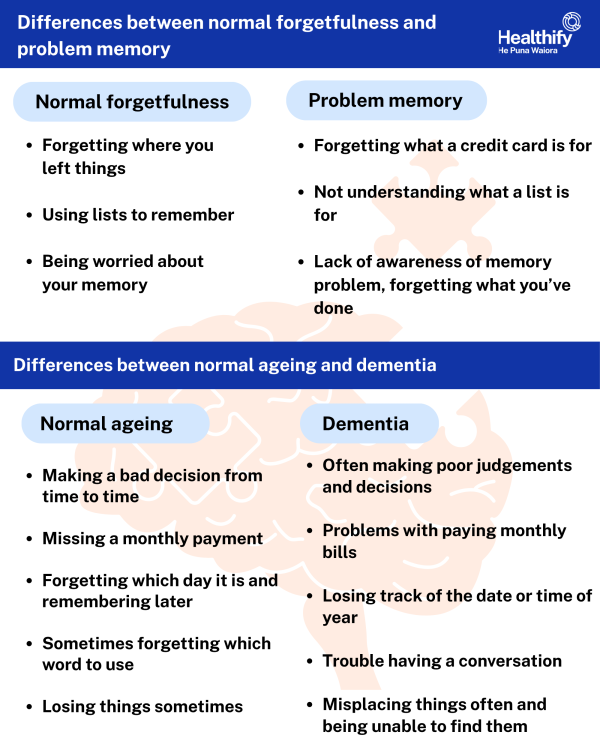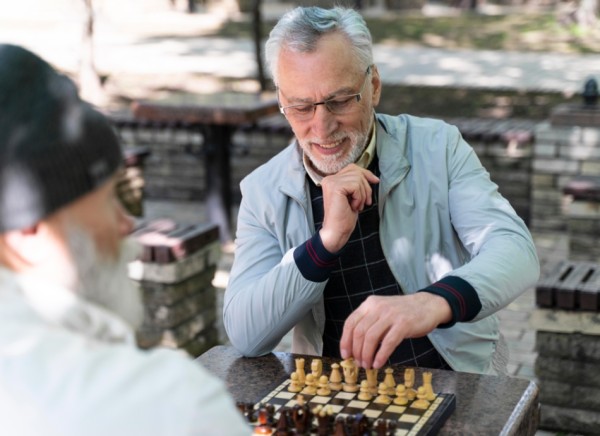If you're a frequent visitor to Healthify, why not share our site with a friend? Don't forget you can also browse Healthify without using your phone data.
Is my forgetfulness normal?
Key points about forgetfulness
- As you get older, you may find your memory doesn’t always work as well as it used to.
- Just because you can be a bit forgetful at times, doesn’t mean you have dementia.
- Some types of forgetfulness are a normal part of ageing while others might be signs of a memory problem.
- There may be another underlying reason for your forgetfulness.
- If you have concerns about your memory, talk to your healthcare provider.

It’s normal for memory and other thinking skills to get a little bit worse as you get older. However it's not part of normal ageing for this to make it hard to live your life independently.
Dementia is not the only cause of memory loss. Most people who sometimes forget things don’t have dementia. Other causes for memory problems include aging, physical and mental health problems, stress, medicines and mild cognitive impairment (MCI).
Unless your forgetfulness is affecting your day to day life and getting worse over time it’s not likely to be a sign of dementia.
However, it may be more than just forgetfulness if you find your loss of memory or thinking processes is affecting your ability to:
- work
- live independently
- do hobbies
- keep up your social life.
If you have any concerns about your memory, talk to your healthcare provider.
As you get older, changes occur in all parts of your body, including your brain. This means it might take longer to learn new things, you might not remember information as well as you used to, or you lose things such as your glasses.
It’s normal for your memory not to work well when you’re distracted or concentrating on too many things at the same time. That's why you’re more likely to forget things when you’re stressed.
- Major life events such as the death of a loved one can affect your memory.
- Being hungry or tired can also make you forgetful temporarily.
- Some medicines, such as benzodiazepines for anxiety or sleep, or combinations of medicines can cause forgetfulness or confusion
- Neurodevelopmental conditions such as ADHD which effect how your brain functions can cause lifelong memory problems which are worse when these other factors are also happening.
Physical and mental illnesses which can affect your memory are:
- A head injury from a fall or accident, even if you don't lose consciousness.
- Anxiety or depression can cause forgetfulness, confusion, difficulty concentrating and other problems that disrupt daily activities.
- Long term alcohol use can seriously harm your mental abilities. Alcohol can also cause memory loss by interacting with medicines.
- Vitamin B-12 deficiency happens more often in older adults and can cause memory problems. Vitamin B-12 helps maintain healthy nerve cells and red blood cells.
- An underactive thyroid gland (hypothyroidism) can result in forgetfulness and other thinking problems.
- Untreated obstructive sleep apnoea can affect how your memories are stored overnight.
- A tumour or infection in your brain can cause memory problems or other dementia-like symptoms.
The following types of memory loss are all normal and not a sign of dementia:
Transience – the tendency to forget facts or events over time. Memory is 'use-it-or-lose-it', the memories you use most often are the least likely to be forgotten.
Absentmindedness – forgetting because you don’t pay close enough attention. You forget where you just put your pen because you didn't focus on where you put it in the first place. You were thinking of something else (or, perhaps, nothing in particular), so your brain didn't record the information securely.
Blocking – someone asks you a question and the answer is right on the tip of your tongue, but you just can't think of it. Sometimes what stops you remembering is a strong memory similar to the one you're looking for.
Misattribution – this happens when you remember something accurately in part, but get some detail wrong, such as the time, place or person involved. As you get older, you take in fewer details when picking up new information because you're not concentrating and processing information as quickly. You are most likely to do this with old memories.
Suggestibility – this is when your memory of something is affected by the power of suggestion. Information you learn about something afterwards gets mixed in with your memory of it.
Bias – when your perceptions are being recorded in your brain, they’re filtered by your personal biases – experiences, beliefs, previous knowledge and even your mood. When you bring back a memory, your biases can influence what information you actually recall.
Persistence – the persistence of memories of traumatic events, negative feelings and ongoing fears is another form of memory problem. It's related to post traumatic stress disorder (PTSD) and depression, but is not a symptom of dementia.
These types of memory are expected to get worse when you get older
- Working memory – short term storage and processing of information over seconds or minutes, such as a person’s name or phone number, or directions.
- Prospective memory – remembering to do something in the future, such as taking your medicines at the same time each day.
- Episodic memory – remembering events and the situation they happened in. You may be able to learn new information and recall recently learned information, but the memories might be less accurate and detailed, and older memories will likely stay longer than newer ones.
These types of memory are usually held longest
- Semantic memory – your lifetime of knowledge, ideas and concepts, such as historical knowledge and vocabulary.
- Procedural memory – learned skills needed to do things, such as how to ride a bike and how to unlock a door.
Often, memory loss that disrupts your life is one of the first signs of dementia. Both normal brain changes with ageing and the separate problem of dementia can be happening at the same time. So how can you tell if your forgetfulness is normal or an early sign of dementia? There are some differences between the type of memory changes which can help.
The infographic below gives examples of normal forgetfulness and ageing versus problem memory and dementia.

Image credit: Healthify He Puna Waiora adapted from National Institute on Aging(external link)
Other early signs of dementia might include:
- no longer being able to judge the passing of time
- becoming disorientated – forgetting where you are or how you got there
- forgetting words or using words in the wrong context or place in a sentence
- having problems starting a conversation of keeping one going
- having changes in your mood or behaviour for no obvious reason
- finding it hard to concentrate on reading a book or following a movie or TV programme
- losing interest in hobbies or activities
- asking the same questions repeatedly
- putting items in inappropriate places, such as leaving the remote control in the bathroom
- hoarding or stock piling things.
Read more about 10 warning signs of dementia(external link).
Mild cognitive impairment (MCI) is when your memory or thinking isn’t working well, but it's not enough of a problem to affect your day-to-day life and activities.
While you, your whānau or close friends will be aware of this decline in your memory or thinking, unlike people who have dementia, you can still be independent in your daily life.
If you have MCI, you have an increased risk of developing dementia, especially if your main difficulty is with your memory. The greater the level of memory impairment the greater the risk of developing dementia. However, some people with mild cognitive impairment don't get worse, and a few eventually return to normal.
If you have MCI, see your healthcare provider every year. Keeping yourself as healthy as possible can help lower the risk of dementia developing. Read more about the risk factors for dementia.
Some dementia risk factors are difficult or impossible to change, such as ageing and your genes. But there are lifestyle factors that affect your risk. By changing these you could reduce your risk of dementia by up to 45%.
The 7 key things to do are to look after your heart, be physically active, eat healthy food, use hearing aids and glasses if you need them, challenge your brain and enjoy social activity. Read more about reducing your risk of dementia and proven ways to keep your brain healthy.
Apps reviewed by Healthify
You may find it useful to look at some dementia apps and exercise apps for older adults.

Image credit: Freepik
Memory loss, mild cognitive impairment(external link) Health New Zealand | Te Whatu Ora, NZ
Apps
Dementia apps
Exercise apps for older adults
References
- Memory loss and dementia(external link) PatientInfo, UK, 2025
- Early signs of dementia(external link) Dementia Canterbury, NZ, 2022
- Memory problems, forgetfulness and aging(external link) National Institute on Aging, US, 2023
- Forgetfulness — 7 types of normal memory problems(external link) Harvard Health Publishing, US, 2021
- Age-related cognitive decline – prevention and future planning(external link) BPAC, NZ, 2020
Credits: This content has been collaboratively developed by Health New Zealand | Te Whatu Ora, KidsHealth, and Healthify He Puna Waiora to provide trusted health information.
Reviewed by: Dr Emma Dunning, Clinical Editor and Adviser
Last reviewed:





